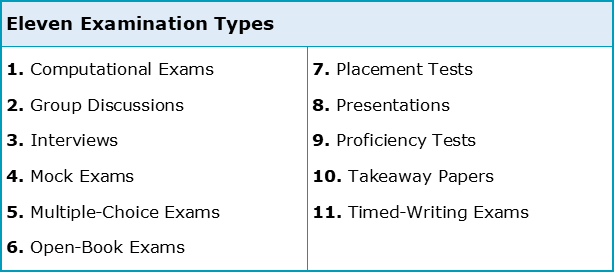Which 12 tips are best for passing academic exams?

This is the second and final chapter about Exam Revision. To complete this reader, read each chapter carefully and then unlock and complete our materials to check your understanding.
– Review the 11 examination types possible at university
– Introduce 12 tips for passing exams successfully
– Provide worksheets to check progress and understanding
Before you begin reading...
-
video and audio texts
-
knowledge checks and quizzes
-
skills practices, tasks and assignments
Chapter 2
This second and final chapter about exam revision now focuses on the twelve most useful tips for completing university exams successfully and confidently. As is shown in the table below, our short reader on exam types introduces eleven common exam types that we will also be referring to throughout this chapter:

Tip 1: Prepare, Prepare, Prepare
Our first tip on the list is probably the most important – and that’s to prepare as much as you can before sitting your exam. During the semester, such preparation will usually involve attending all lectures and seminars and doing any readings or homework that your tutor sets – remembering to make notes and pay careful attention at all times. Closer to the final exam, students should create a revision plan and stick firmly to achieving their goals. Try using flashcards to help your memory, gather your notes together into one place, and look over any examples or structures you have that may help you to organise your answers. This advice is particularly true for group discussions, open-book exams, presentations and timed-writings.
Tip 2: Practice, Practice, Practice
Another useful tip, particularly when delivering performances such as group discussions, interviews and presentations, is to practice as much as you can before the final exam. Whether this means rehearsing in front of a mirror, completing multiple mock exams or completing self-study activities on Academic Marker for example, the more practice you can get, the more likely it is that you’ll walk into that exam confident and well-prepared.
Tip 3: Check the Rubrics
One aspect that students often forget about is remembering to check the rubrics that are associated with their exams. A rubric is a document that your assessor will use in an attempt to consistently and fairly grade your paper. Such rubrics are particularly necessary for tutors when grading subjective examinations, such as open-book exams, takeaway papers and timed-writings. These documents should detail what the assessor is looking for in terms of content, delivery, topic knowledge, grammar and lexis, and coherence and cohesion. Find a copy of your relevant marking rubric, read it very carefully, and try to make sure that you’re precisely fulfilling those criteria so that your assessor can grade you as highly as possible.
Tip 4: Make Predictions
The fourth tip is a difficult one, but if a student can be successful in this area then they’ll greatly increase their likelihood of passing with an impressive grade. Especially true for computational exams, interviews, multiple-choice exams, takeaway papers and timed-writings is that a learner should do their best to make predictions about the kinds of questions, topics and concepts that are likely to be included. If students can do this with accuracy, they’ll potentially save themselves valuable time and energy during the exam – and will likely walk out with more confidence and a more impressive final grade.
Tip 5: Follow the Rules
While it might go without saying, students often break the rules in university examinations which can be disruptive for both them and for other students. Whether it’s accidental or purposeful, a student that brings notes into an exam when they shouldn’t, or that brings items of clothing or stationary that are prohibited, may find themselves negatively affecting the outcome of their exam. In winter, for example, we’ve seen students shivering because they had to remove prohibited jackets and coats and weren’t wearing sufficient clothing underneath. More seriously, by not following the rules of your exam, you may even be accused by the examiners of cheating – potentially resulting in a failing grade.
Tip 6: Watch the Clock
Many exams are timed, and the timings are usually quite strict to encourage students not to write too much. In truth, most students that are successful during examinations are usually able to pay careful attention to the clock, dividing their work across the tight examination time accurately and with efficiency.

If you have five equally weighted questions to complete and spend 70% of your time completing two of them, for example, you’re likely going to be extremely stressed for that final 30% of that exam. Instead, pay careful attention to the time allowed and do your best to allocate the sections of your exam an appropriate time weighting.
Tip 7: Read Every Question
For any exam that requires you to select questions from a number of possible options, it’s important that students read each question carefully and consider which questions would be most appropriate for them before starting to write. Don’t necessarily go for the easiest questions first but instead attempt those task that you are confident will score you the highest marks – and that you can answer precisely, objectively and concisely.
Tip 8: Use Highlighters
Another tip is to bring highlighter pens into your exam, if you’re allowed. When reading through any headings, instructions or larger pieces of text, it might be worth highlighting any key vocabulary, concepts or pieces of evidence that you may later wish to include in your own writing. A colour code can also help here, potentially saving you valuable time later when you may need to locate a piece of information or fact quickly and easily for inclusion in your essay.
Tip 9: Create a Plan
Once you’ve read through the instructions and questions and have highlighted the key information, before you start writing an essay in a timed-writing exam you should spend some of that time creating a plan. By carefully considering your overall arguments, the ordering of your elements, and which evidence you’re going to include, you will likely create a more logical, cohesive and coherent piece of work. Just make sure you don’t allocate too much of the exam time to making your plan.
Tip 10: Use Neat Crossing Out
Something your tutors might remind you of (and they’re absolutely right) is to cross out any errors or mistakes neatly during a written exam by using a single line. Take a look at the following two examples and decide which looks easier to read/mark:


We’re sure you’ll agree that the first excerpt is much easier for the examiner to understand, while the second excerpt is somewhat confusing and messy. An essay that cannot be read easily is one that has the potential to lose marks for little reason other than layout and neatness. By always using a simple line when deleting errors in exams, students can avoid losing marks in this unnecessary way.
Tip 11: Be Concise
Word counts are important, and so is sticking to the tight timing of an exam. Academic writing is conventionally concise, meaning that students should do their best to use as few words as possible to convey their argument or message. Use too many words and not only may you be penalised for going over the word count, but your tutor may also deduct marks for an essay that rambles and lacks concision.

Tip 12: Don’t Give Up
Finally, don’t give up during the middle of an exam. Even if you aren’t confident about the answers, it’s better to write something on the page than nothing at all. Likewise, if you can’t think of anything else to write, then spend the last minutes of the exam checking over what you’ve already written for any grammar or vocabulary errors, inconsistencies or incorrect answers.
Tutors are always concerned by those students that walk out of an exam long before the time is up – and are completely baffled by those who fall asleep midway through. A student that has tried to use all of their examination time as effectively as possible is one that’s more likely to succeed overall.
Well done on completing this short reader about exam revision. Now consider downloading and completing our Chapter 2 Worksheet. You may also wish to access our example exams or other related topics to further expand your knowledge of exams, such as our short readers on exam preparation and exam types.
To reference this reader:
Academic Marker (2022) Exam Revision. Available at: https://academicmarker.com/academic-guidance/examinations/exam-revision/ (Accessed: Date Month Year).
Downloadables
Once you’ve completed both chapters in this short reader about Exam Revision, you might then wish to download our Chapter Worksheets to check your progress or print for your students. These professional PDF worksheets can be easily accessed for only a few Academic Marks.
Chapter 1 explores the topic: Which revisions strategies are best for uni exams? Our Chapter 1 Worksheet (containing guidance, activities and answer keys) can be accessed here at the click of a button.
Chapter 2 explores the topic: Which 12 tips are best for passing academic exams? Our Chapter 2 Worksheet (containing guidance, activities and answer keys) can be accessed here at the click of a button.
To save yourself 1 Mark, click on the button below to gain unlimited access to all of our Exam Revision Chapter Worksheets. This All-in-1 Pack includes every chapter, activity and answer key related to this topic in one handy and professional PDF.
Collect Academic Marks
-
100 Marks for joining
-
25 Marks for daily e-learning
-
100-200 for feedback/testimonials
-
100-500 for referring your colleages/friends